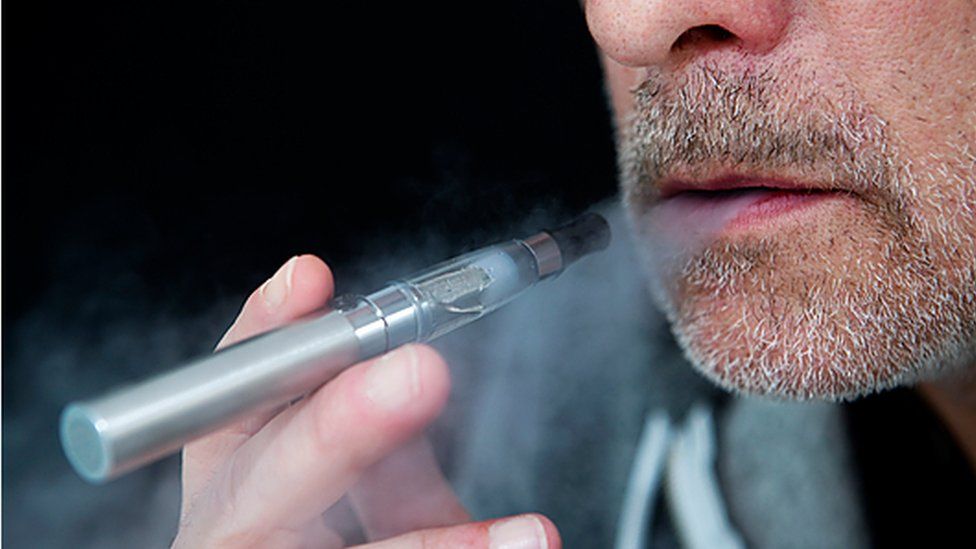E-cigarettes - the fog and haze around the debate
- Published

It's one of the most hotly debated issues in public health.
Are e-cigarettes a good thing as an option for smokers trying to kick their habit? Or are there potential dangers to users and others which might only become apparent after years more research?
Some smoking cessation experts swear by them; others want nothing to do with them.
Now a European Union directive has added a new dimension to the debate.
On 20 May the updated EU Tobacco Products Directive took effect. For the first time, e-cigarettes will be included in its scope.
They contain nicotine but the vapour, produced by heating a flavoured liquid, is said by Public Health England and other authorities to be much safer to inhale than tobacco smoke.
There has been political scrutiny on the issue, with a House of Lords motion tabled calling for the directive to be set aside in the UK.
According to the EU briefing notes on the inclusion of e-cigarettes, "their long-term effects on public health are not yet known.
"As nicotine is an addictive and toxic substance, safety and quality requirements for nicotine-containing e-cigarettes are necessary."
Online advertising barred
The directive bans liquid used in these products in bottles larger than 10ml and storage tanks attached to the devices larger than 2ml.
There are also limits on the nicotine concentration. Online advertising will be barred.
The logic is that people who are not e-cig users need greater protection if they come into contact with the devices, for example children who might accidentally spill or swallow the fluid.
Beryl Keeley of the Medical and Healthcare Products Regulatory Agency, which is responsible for implementing the directive, explains the logic behind it:
"There are potential risks from the exposure of the products to children who may suffer from toxicity and overdose," she says, and there is a need to ensure that "people have available information so they can make an informed choice - the directive also sets minimum standards of quality and safety".
Back to tobacco?
But some have questioned why e-cigarettes should be included in a tobacco products directive when they don't contain tobacco.
Manufacturers such as Totally Wicked, based in Blackburn, say the new regulations will hit their business hard.
The company's managing director Fraser Cropper, who tried and failed to get the new rules thrown out by the European court, says consumers will be the losers:
"Our business will change dramatically. We will no longer be able to sell a range of products we are currently able to sell. It will constrain significantly the range of fluids we sell to our customers."
The regulations will require the company and others to submit designs for new products for approval six months before their launch.
Fashions change quickly, says Mr Cropper, and in that time overseas imports which don't comply with the rules will fill the gap in the market.
Some public health experts believe that reducing choice in the e -cigarette market might push people back to tobacco.
Risk
At a clinic in Leicester, smokers are encouraged to try e-cigarettes along with other products like nicotine gum to help them move away from tobacco.
Louise Ross, managing of the Leicester Stop Smoking Service, is concerned about how some will react to e-cigarettes with lower nicotine content:
"I think the risk is that they will go back to smoking if they can't get the satisfaction from the strong enough liquid and big enough tanks - they may well go back to smoking because it's so much easier to buy cigarettes. They're always there."
Some anti-smoking campaigners are comfortable with the EU directive. Deborah Arnott, chief executive of Ash, said:
"Our research shows that most vapers use less nicotine than the limit set in the new EU regulations and are likely to have to refill their devices no more than a couple of times a day. Concerns that the EU regulations would force the products most vapers use off the market seem to have been overstated."
The debate over e-cigs is far from over. Some argue we don't know enough about the health impact of e-cigs so it's too early to give them a green light. Others say too much regulation will damage the drive to get more people to give up smoking.